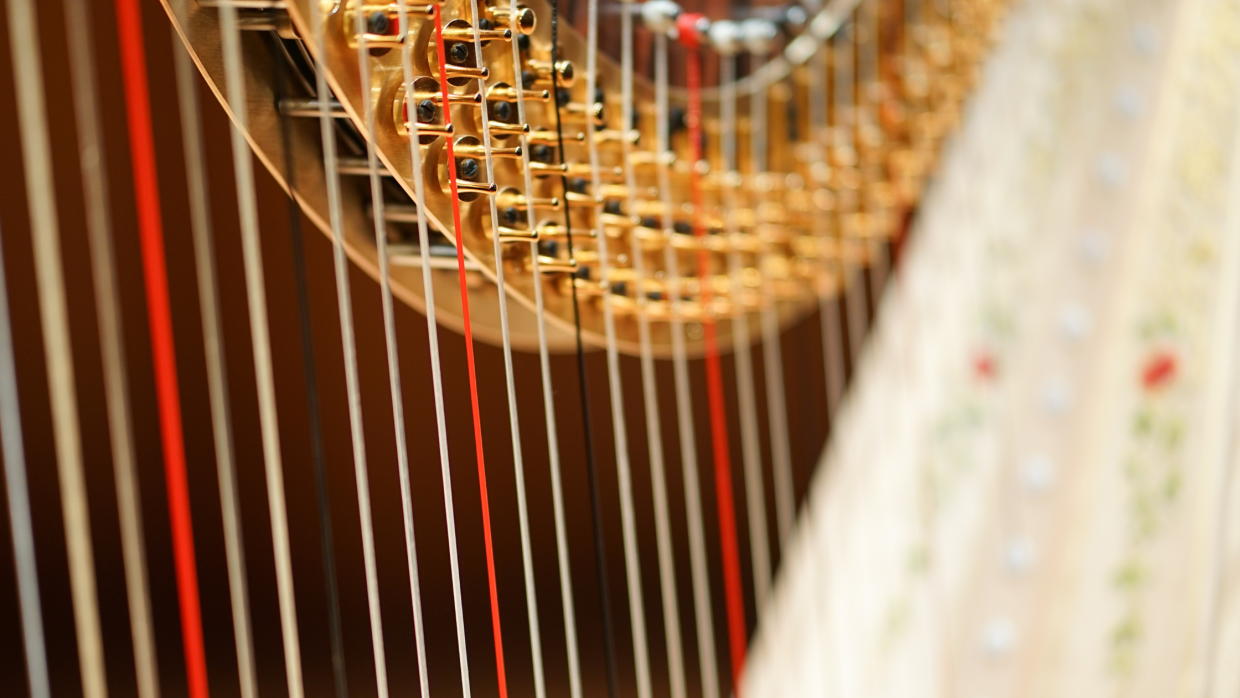The Harp: An Instrument for Every Stage of Life
Insights from Harp Faculty, Phyllis Adams

October 22nd, 2025
Whether you’re exploring the harp for the first time, revisiting it in adulthood, or curious about the benefits and opportunities that come with learning to play, this guide provides an inside look from a seasoned professional and educator.
We spoke with Phyllis Adams, Harp faculty at the Music Institute of Chicago, to explore how the harp can be an excellent choice for any age and stage. From answering common beginner questions to sharing advice for success, Phyllis offers insights for anyone curious about learning harp.
Is the Harp a Good Instrument for Beginners?
With its elegant frame and many strings, the harp may look intimidating, but it might be easier to learn than you think!
“Learning to play the harp may not be as difficult as you imagine. There are several reasons why a harp is a great choice for a beginning musician of any age,” explains Phyllis. “It is difficult to make a harp sound bad, so that one can sound good from the beginning.”
Why the harp is great for beginners:
- Instantly rewarding sound builds confidence
- The visual layout of the strings helps beginners understand pitch and harmony quickly.
- Smaller harps are affordable, portable and available for purchase or rental from numerous companies.
- Appropriate curriculum tailored to fit the needs of all beginning musicians of any age.
The Benefits of Learning Harp
Playing the harp can be beneficial at any age. Like learning any instrument, playing the harp offers benefits that extend beyond the practice room.
“Playing the harp quickly improves hand-eye coordination, dexterity of fingers, attention span, and memory,” says Phyllis. “It’s an enjoyable way to appreciate the importance of discipline and dedication.”
Key benefits of playing the harp:
- Cognitive development:
- Fine motor coordination
- Stress relief
- Discipline and focus
- Creative outlet
These benefits extend to adults too, and they may bring some unique advantages to their harp study. “You are never too old to learn to play the harp,” says Phyllis. “A five- to six-year-old might have more flexibility/dexterity of finger movement, but in the long run an adult can bring depth of feeling and intellectual curiosity from life experiences that young students wouldn’t have.”
Moreso, playing the harp provides opportunities to connect with others. “Playing the harp brings the harpist into social settings that a non-musician does not get to experience, facilitating more opportunities to meet new friends,” Phyllis adds.
What Opportunities Are There for Harpists?
One of the harp’s greatest strengths is its versatility. Whether you play for personal enjoyment or pursue a professional path, there are a number of ways to enjoy the harp.
Professional opportunities:
- Performing in orchestras, chamber groups, or theater productions
- Accompanying choirs, vocalists, or instrumental ensembles
- Teaching and mentoring
- Performing for weddings, events, and recording sessions
Casual and community opportunities:
- Playing for family and friends
- Joining local harp circles or chamber groups
- Collaborating with peers for informal performances
- Performing in school recitals or events
Phyllis emphasizes how chamber music can be an opportunity for both casual and professional harp players. “There are unlimited chamber music opportunities at all levels of ability. You only need one other musician to play with. It can be just for fun, playing for friends or performing in a professional ensemble.”
Finding Success as a Harpist
Success in learning an instrument isn’t measured by perfection, but by persistence, curiosity, and joy in the process.
“In order to succeed, you need to love whatever it is that you are learning to do and to embrace this as a lifetime commitment. Only then will you succeed.”
Phyllis reminds students that progress looks different for everyone and that individuality should be celebrated:
“Success means different things to different people at different times in their lives. Everyone’s goals are different and should be respected.”
Her approach combines structure and inspiration, helping students develop both skill and confidence:
• Daily practice is a great habit to have!
• Don’t “hope” that your performance goes well, do what it takes to “ensure” it goes well.
• Don’t begrudge learning – learn to understand and fix what is not working.
• Remember, the only limits we have, are those that we put upon ourselves
Ready to Start Your Harp Journey?
Whether you’re a first-time learner, a returning musician, or a parent exploring lessons for your child, the Music Institute of Chicago offers harp instruction for all ages and levels.
